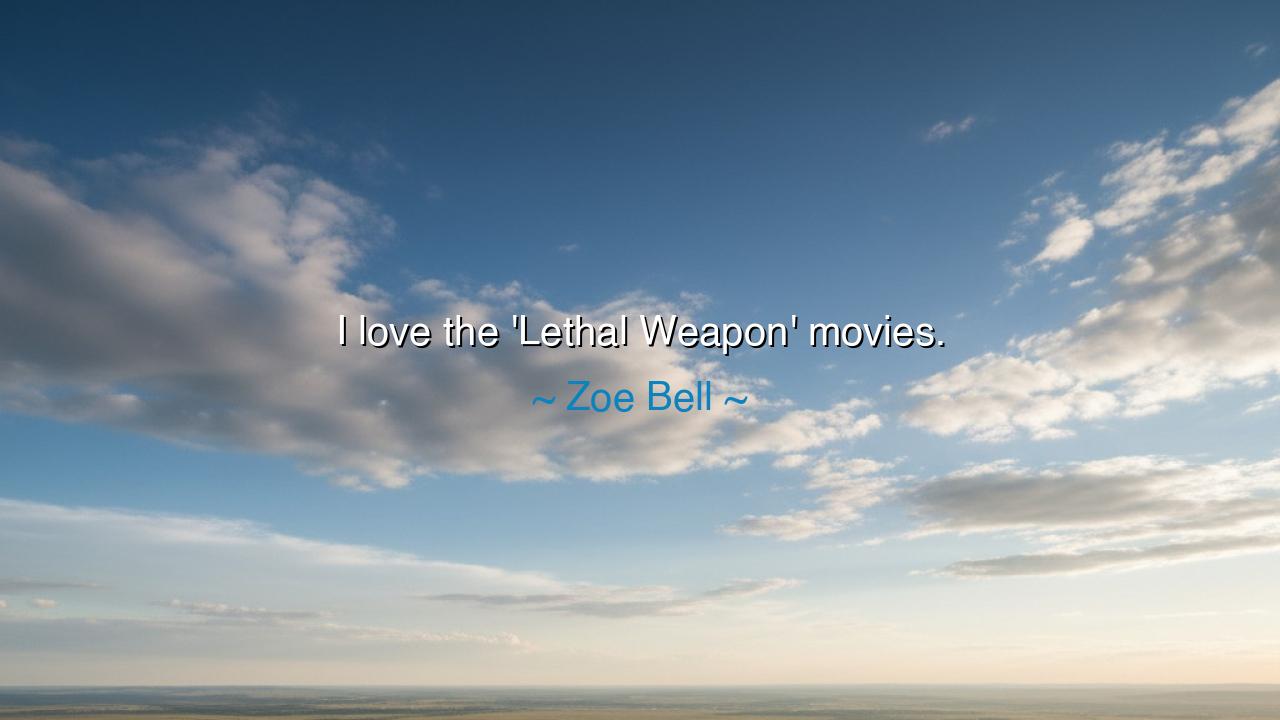
I love the 'Lethal Weapon' movies.






Zoe Bell’s declaration, “I love the ‘Lethal Weapon’ movies,” is a simple, yet profound statement that speaks to the power of cinema and the deep, primal connection we have with stories of action, bravery, and human struggle. In her love for the Lethal Weapon films, Bell touches upon something timeless and universal—the thrill of watching characters who face overwhelming challenges, who fight not just for survival but for justice and meaning. These films, in their essence, capture the human spirit in all its rawness, showcasing the complexities of loyalty, courage, and the often tumultuous path of redemption.
At the heart of the Lethal Weapon series lies a central theme: the conflict between light and dark, the good and the bad within each individual. The characters, particularly the iconic duo of Martin Riggs and Roger Murtaugh, embody this struggle. Riggs is a man tortured by loss and driven by inner demons, while Murtaugh, older and wiser, represents stability and the anchoring force of family. Their relationship, forged through conflict and mutual respect, mirrors the struggles we all face—the desire to move past personal turmoil while also standing firm against the chaos of the world around us. Bell’s admiration for these films speaks to a universal need to witness courage in the face of adversity, and to find strength in the bonds we form with others.
This dynamic—the heroic partnership, the fight against overwhelming odds—finds echoes in the ancient tales that have shaped human culture for millennia. Consider the story of Gilgamesh, the Sumerian king and hero of the oldest known epic. Gilgamesh, much like Riggs, is a figure torn between his greatness and his human flaws. His journey is one of growth, where he learns that true heroism lies not in invincibility but in facing the darkness within oneself and the world. Enkidu, his companion, serves as his moral anchor, much as Murtaugh does for Riggs. The lesson is clear: we are strongest not in isolation, but in the relationships we forge with others.
What Zoe Bell taps into with her love for Lethal Weapon is not just an admiration for fast-paced action, but an appreciation for the human resilience that these films portray. It is the hero’s journey, an enduring theme that stretches back to the Greek myths, to Hercules and his twelve labors, to Odysseus's long voyage home. In these ancient stories, heroes were often not defined by their strength or power, but by their ability to confront and overcome their inner struggles. Similarly, the characters in Lethal Weapon find their true strength not in their weapons, but in their ability to confront personal demons, to push through their pain, and to find redemption through self-sacrifice and brotherhood.
Moreover, Zoe Bell’s admiration for these films also speaks to a desire for catharsis, a yearning to witness the moral victories of characters who, in their struggle, mirror the conflicts of our own lives. Action films, particularly those with heroes like Riggs and Murtaugh, offer us a way to process our fears, to see the complexities of life distilled into clear-cut struggles between good and evil. These movies allow us to witness triumph over adversity in a way that offers hope for our own personal battles. In the world of the film, right and wrong are often stark, giving us a sense of resolution and closure that is sometimes lacking in our real lives.
There is a powerful lesson in Bell’s affection for these films, one that speaks to the need for courage in the face of life’s challenges. Just as Riggs and Murtaugh navigate their personal pain while confronting external threats, we too must learn to face our own inner demons. The journey toward redemption—whether in the form of healing personal wounds or in striving to be better in our relationships—requires both self-awareness and resilience. We must find those around us who anchor us, who help us see beyond our pain and guide us toward the light.
In our lives, we should seek out moments of catharsis, times when we confront our deepest struggles and emerge stronger. Like Riggs and Murtaugh, we must understand that true heroism is not about defeating the enemy, but about overcoming the battles within ourselves, and learning to trust and rely on others in the process. In the face of darkness, whether that be fear, grief, or insecurity, we are called not to turn away but to rise, to fight, and to find our way toward healing and redemption. Just as Bell finds joy in the struggles of Lethal Weapon, we too can find strength in the stories that inspire us to become our best selves.






AAdministratorAdministrator
Welcome, honored guests. Please leave a comment, we will respond soon